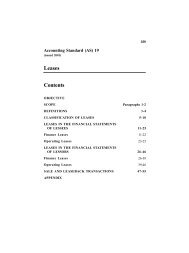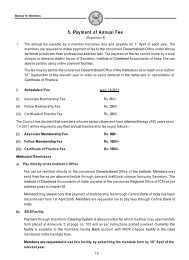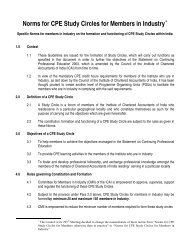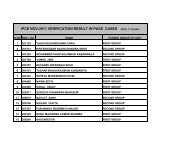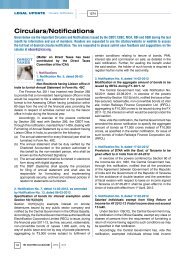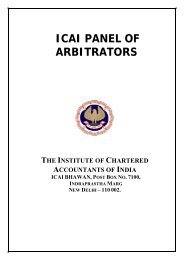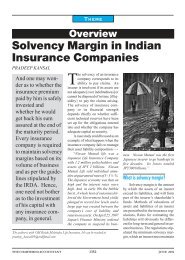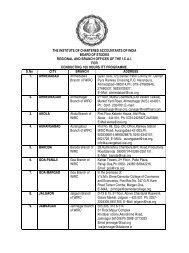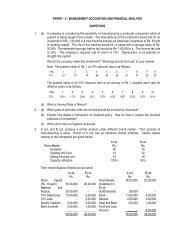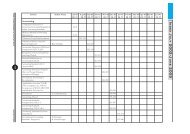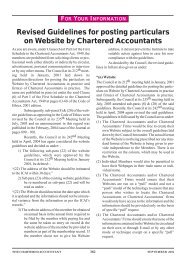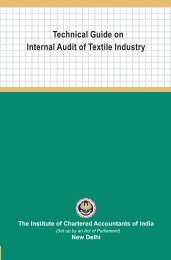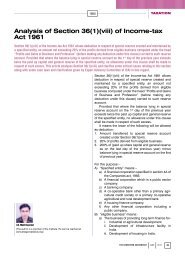The Chartered Accountant
The Chartered Accountant
The Chartered Accountant
Create successful ePaper yourself
Turn your PDF publications into a flip-book with our unique Google optimized e-Paper software.
Introduction<br />
1. <strong>The</strong> purpose of this Standard on<br />
Internal Audit is to establish standards<br />
and provide guidance in respect of<br />
terms of engagement of the internal<br />
audit activity whether carried out in<br />
house or by an external agency. A clarity<br />
on the terms of the internal audit<br />
engagement between the internal auditors<br />
and the users of their services<br />
(hitherto known as “auditee”) is essential<br />
for inculcating professionalism<br />
and avoiding misunderstanding as to<br />
any aspect of the engagement.<br />
2. <strong>The</strong> internal auditor and the<br />
auditee should agree on the terms<br />
of the engagement before the its<br />
commencement. <strong>The</strong> agreed terms<br />
would need to be recorded in an engagement<br />
letter. Normally, it is the responsibility<br />
of the internal auditor to<br />
prepare the engagement letter and it is<br />
to be signed both by the internal auditors<br />
as well as the auditee.<br />
Terms of Engagement<br />
3. <strong>The</strong> terms of engagement of the<br />
internal audit inter alia define the scope,<br />
authority, responsibilities, confidentiality,<br />
limitation and compensation of<br />
the internal auditors. <strong>The</strong> terms of<br />
engagement should be approved<br />
by the Board of Directors 1 or a relevant<br />
Committee thereof such as<br />
the Audit Committee or such other<br />
DECEMBER 2008 1108 THE CHARTERED ACCOUNTANT<br />
STANDARDS<br />
Standard on Internal Audit (SIA) 8<br />
TERMS OF INTERNAL AUDIT ENGAGEMENT<br />
<strong>The</strong> following is the text of the Standard on Internal Audit (SIA) 8, Terms of Internal Audit<br />
Engagement, issued by the Institute of <strong>Chartered</strong> <strong>Accountant</strong>s of India. <strong>The</strong> Standard should<br />
be read in the conjunction with the “Preface to the Standards on Internal Audit”, issued by the<br />
Institute.<br />
In terms of the decision taken by the Council of the Institute at its 260 th meeting held in June<br />
2006, the following Standard on Internal Audit shall be recommendatory in nature in the initial<br />
period. <strong>The</strong> Standard shall become mandatory from such date as may be notified by the Council<br />
in this regard.<br />
person(s) as may be authorised by<br />
the Board in this regard. <strong>The</strong> terms<br />
should be reviewed by the internal<br />
auditor and the audit committee<br />
periodically and modified suitably,<br />
if required, to meet the changed<br />
circumstances.<br />
Elements of Terms of Engagement<br />
4. <strong>The</strong> following are the key elements<br />
of the terms of the internal<br />
audit engagement:<br />
i. Scope<br />
ii. Responsibility<br />
iii. Authority<br />
iv. Confidentiality<br />
v. Limitations<br />
vi. Reporting<br />
vii. Compensation<br />
viii. Compliance with Standards<br />
Each of these elements has been discussed<br />
in the following paragraphs.<br />
Scope<br />
5. Paragraph 3.1 of the Preface<br />
to the Standards on Internal Audit<br />
describes internal audit as “an independent<br />
function, which involves a<br />
continuous and critical appraisal of<br />
the functioning of an entity with a<br />
view to suggest improvements thereto<br />
1 Or an equivalent authority where the entity is not in a corporate form. For example, the Board of Trustees in a cooperative society.<br />
and add value to and strengthen the<br />
overall governance mechanism of the<br />
entity, including the entity’s strategic<br />
risk management and internal control<br />
system.”<br />
6. <strong>The</strong> terms of the engagement<br />
should contain a statement in respect<br />
of the scope of the internal<br />
audit engagement. It should<br />
clearly delineate the broad areas<br />
of function of internal audit like<br />
evaluating internal controls, review<br />
of business process cycle controls,<br />
risk management and governance.<br />
7. It should indicate areas where<br />
internal auditors are expected to<br />
make their recommendations and<br />
value added comments.<br />
8. <strong>The</strong> terms of engagement<br />
should clearly mention that the internal<br />
auditor would not, ordinarily,<br />
be involved in the preparation<br />
of the financial statements of the<br />
auditee. It should also be made<br />
clear that the internal audit would<br />
not result in the expression, by the<br />
internal auditor, of an opinion, or<br />
any other form of assurance on the<br />
financial statements or any part<br />
thereof of the auditee.<br />
9. <strong>The</strong> scope of the terms of the<br />
engagement, after delineating the<br />
broad areas of function of internal<br />
audit, should clarify that any additional<br />
services that are not encom-



